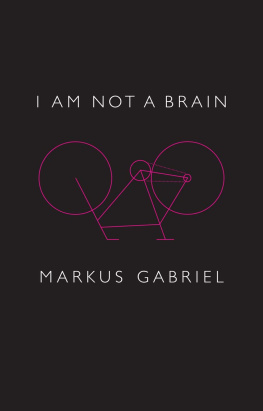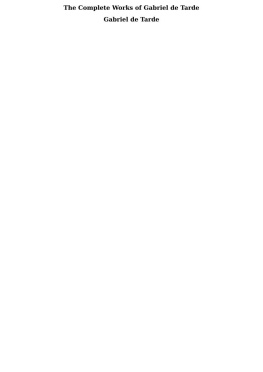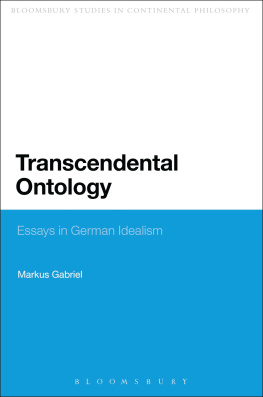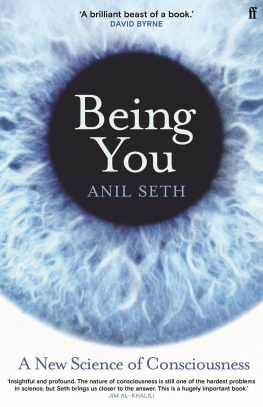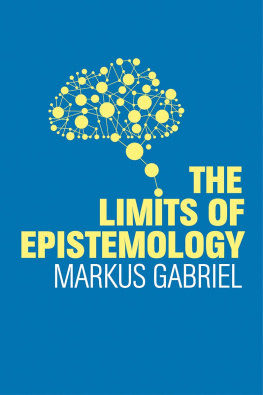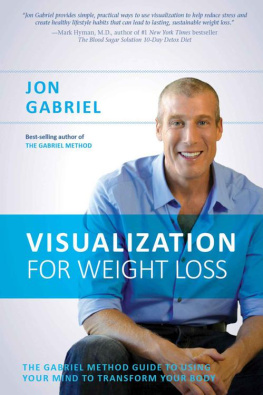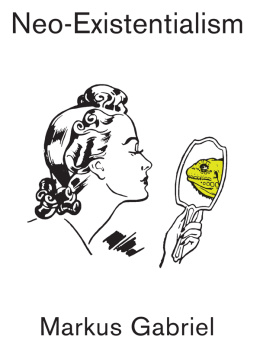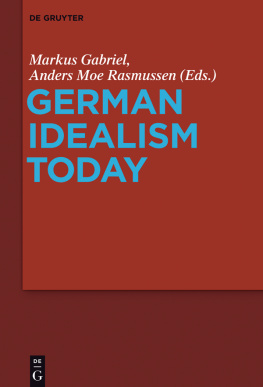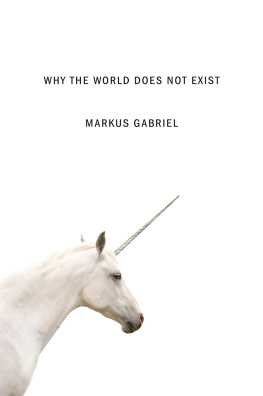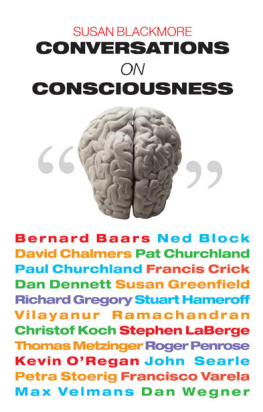Contents
Guide
Pages

For Marisa Lux
Become who you are!
I am Not a Brain
Philosophy of Mind for the Twenty-First Century
Markus Gabriel
Translated by Christopher Turner
polity
First published in German as Ich ist nicht Gehirn. Philosophie des Geistes fr das 21. Jahrhundert by Ullstein Buchverlage GmbH, Berlin. Published in 2015 by Ullstein Verlag.
This English edition Polity Press, 2017
Polity Press
65 Bridge Street
Cambridge CB2 1UR, UK
Polity Press
101 Station Landing
Suite 300,
Medford, MA 02155 USA
All rights reserved. Except for the quotation of short passages for the purpose of criticism and review, no part of this publication may be reproduced, stored in a retrieval system or transmitted, in any form or by any means, electronic, mechanical, photocopying, recording or otherwise, without the prior permission of the publisher.
ISBN-13: 978-1-5095-1478-6
A catalogue record for this book is available from the British Library.
Library of Congress Cataloging-in-Publication Data
Names: Gabriel, Markus, 1980- author.
Title: I am not a brain : philosophy of mind for the 21st century / Markus Gabriel.
Description: Malden, MA : Polity, 2017. | Includes bibliographical references and index.
Identifiers: LCCN 2017010106 (print) | LCCN 2017030527 (ebook) | ISBN 9781509514779 (Mobi) | ISBN 9781509514786 (Epub) | ISBN 9781509514755 (hardback)
Subjects: LCSH: Philosophy of mind. | Consciousness.
Classification: LCC BD418.3 (ebook) | LCC BD418.3 .G33 2017 (print) | DOC 128/.2--dc23
LC record available at https://lccn.loc.gov/2017010106
The publisher has used its best endeavours to ensure that the URLs for external websites referred to in this book are correct and active at the time of going to press. However, the publisher has no responsibility for the websites and can make no guarantee that a site will remain live or that the content is or will remain appropriate.
Every effort has been made to trace all copyright holders, but if any have been inadvertently overlooked the publisher will be pleased to include any necessary credits in any subsequent reprint or edition.
For further information on Polity, visit our website: politybooks.com
as we remind ourselves that no age has been more skillful than our own in producing myths of the understanding, an age that produces myths and at the same time wants to eradicate all myths.
Sren Kierkegaard, The Concept of Anxiety
Introduction
We are awake and thus conscious; we have thoughts, feelings, worries and hopes. We speak with each other, found states, choose parties, conduct research, produce artworks, fall in love, deceive ourselves and are able to know the truth. In short: we humans are minded animals. Thanks to neuroscience we know, to some extent, which areas of the brain are active when someone shows us a picture, for instance, or prompts us to think of something in particular. We also know something about the neurochemistry of emotional states and disorders. But does the neurochemistry of our brain ultimately guide our entire conscious mental life and relations? Is our conscious self only our brains user interface, so to speak, which in reality does not contribute at all to our behavior but only accompanies what actually happens, as if it were an unimportant spectator? Is our conscious life thus only a stage upon which a show is performed, in which we cannot really that is, freely and consciously intervene?
Nothing is more obvious than the fact that we are minded animals who lead a conscious life. And yet, this most evident fact about ourselves gives rise to countless puzzles. Philosophy has occupied itself with these puzzles for millennia. The branch of philosophy that is concerned with human beings as minded animals, these days, is called philosophy of mind. It is more relevant today than ever before, as consciousness and the mind in general are at the center of a whole variety of questions for which we currently have nothing that even comes close to a full explanation in terms of our best natural sciences.
Many consider the nature of consciousness to be one of the last great unsolved puzzles. Why, anyway, should the light turn on, so to speak, in some product of nature? And how is the electrical storming of neurons in our skull connected to our consciousness? Questions such as these are treated in subfields of the philosophy of mind, such as the philosophy of consciousness, and in neurophilosophy.
Thus it is here a question of our very selves. I first present a few of the main thoughts of the philosophy of mind with reference to central concepts such as consciousness, self-consciousness and self. In the wider public and in various disciplines outside of philosophy, there is much talk about these concepts, mostly without awareness of the philosophical background, which leads to confusion. Hence, to start out with, I discuss this background with as few philosophical assumptions as possible.
My sketch of the philosophical background of many of the conceptual building blocks of our self-understanding as minded animals forms the foundation of the second main goal of this book: the defense of our freedom (our free will) against the common idea that someone or something deprives us of our freedom unbeknown to us whether it be God, the universe, nature, the brain or society. We are free through and through, precisely because we are minded animals of a particular kind. The particularity of our mind consists in the fact that we constantly work out a historically shifting and culturally varying account of what exactly it takes to be the kind of minded animal we are. Whereas some believe that we have an immortal soul which accounts for the various mental processes we constantly experience, at the other extreme end of possibilities, many are happy to accept that all their mental processes are ultimately identical to brain states.
In this book, I argue that the truth indeed lies between these untenable extremes (and their more sophisticated versions spelled out by contemporary philosophers and mind scientists of various stripes). Here, the main idea is that what we call the mind is really the capacity to produce an open-ended list of self-descriptions which have consequences for how humans act. Humans act in light of their self-understanding, in light of what they believe to be constitutive of a human being. For instance, if you believe that your capacity to act morally presupposes that your soul has an immortal nature, you will live differently from someone who (like me) is convinced that they will live only once and this is the source for our ethical claims. Given that nothing would matter to us at all if we werent conscious, sentient creatures with beliefs about what that very fact means, anything which matters to us, anything of any importance hinges on our self-conception as minded. However, there is a vast plurality of such self-conceptions spread out through human history as we know it from the writings and cultural artifacts of our ancestors as well as from the cultural variation across humanity as we find it on our planet right now.
It will turn out that we are neither pure genetic copying machines, in which a brain is implanted giving rise to the illusion of consciousness, nor angels who have strayed into a body but, in fact, the free-minded animals whom we have considered ourselves to be for millennia, animals who also stand up for their political freedoms. Yet, this fact about ourselves is obscured if we ignore the variation built into the capacity to conceive of oneself as minded.

